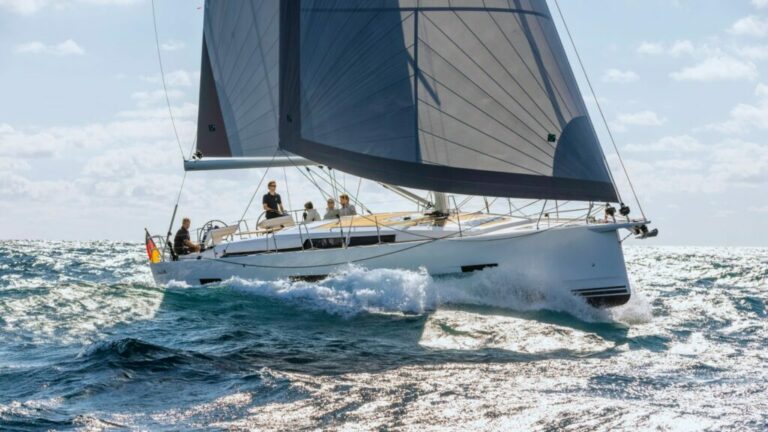
The right boat can make you happy every day of your trip, and the wrong one can cause a lot of inconveniences and even ruin your vacation.
First of all, decide on how you plan to spend your time and what your priorities are. Generally speaking, all yachtsmen can be split into two camps: amateurs and professionals. The amateurs prefer to do nothing on the boat and simply spend time enjoying nature, food and water. The professionals, on the other hand, appreciate adrenaline, drive and speed.
So if you’re from the first camp and you value comfort above all
Consider catamarans. It might be the best decision for you, as the comfort level on a catamaran will be higher in most cases, while the loss of traditional monohull performance under sails you might not even notice. However, do bear in mind that a catamaran does take up more space in marinas, than a monohull boat. Therefore, berths in ports will cost more, and there might not be enough room.

Choose a boat with a wider hull, for example, the new Beneteau Oceanis. A wider hull means more comfort inside, including in the cabins.
When choosing a boat, choose newer ones. Boats, like cars, can be around 10 years old or even more, but more often they are the exception. The materials deteriorate, plus the boat simply becomes obsolete, so if you’re not a fan of vintage, get a boat under 5 years old, it will be more pleasant to use and less likely to cause you any problems during the trip.
Swimming platform. An indispensable accessory for a beautiful life on the boat. Swimming at the anchorages gives you a great extension to the boat, set at water level, on which you can have a great time all together.

Alternatively, get rid of the dinghy. Unless you plan to anchor and sail ashore a lot, the dinghy will be more of a nuisance, taking up valuable deck space, squeezing the porthole in the forward cabin and constantly demanding attention. You can sunbathe in the daytime and gaze at the stars on warm nights in the vacant space.
The more bathrooms, the better. It’s not always obvious, but people who are used to comfort are uncomfortable waiting in line to use the toilets. The best ratio is one toilet per cabin.
The ratio of yacht size to the number of cabins. Briefly, the larger, the better. To give you a rough idea, the maximum comfort you will get on a yacht is if you have 3 cabins with a yacht being 50ft or more. Medium comfort is when you have either 2 cabins at 36ft yacht, 3 cabins at 43ft yacht or 4 cabins at 50ft yacht. Finally, the least comfortable yet most common ratios on a charter are 3 cabins at 36ft yacht, 4 cabins at 43ft yacht or 5 cabins at 50ft yacht. These layouts have an understandable economic rationale – the more participants, the cheaper the trip per crew member. All in all, it’s up to you to choose. Also, note that sometimes the cabins are configured vertically, with the beds stacked one above the other; if you’re travelling as a couple or if you simply value more space, you don’t want that option.

If you are the professional
Choose yachts with a classic mainsail (buttoned mainsail). First of all, it’s beautiful. Secondly, a sail with built-in battens has better geometry and works better, especially on sharp courses. Finally, working with a classic mainsail is an art, and once you learn it, you can enjoy the process immensely – just think of fluting with a hand-tied sail on the reel.
Speaking of the mainsail, if you get a model with a cockpit-mounted chase, that is another advantage and the pleasure associated with driving it. We won’t go into too much detail, but this type is much more efficient and fun to sail than other models with no traveller or with the traveller on top of the deckhouse.

The more winches, the better. The optimum set of winches for full sail handling is the front pair for mast handling, the middle pair for the jib, gennaker/spinnaker, the last set is for the mainsail. Properly organised winches also organise the crew, placing everyone in their places. With four winches upfront, plus the rear winches offset to the helm, it is not clear to the crew where to position themselves for general operation. Understandably, this arrangement is made to be able to steer everything from behind the helm, but this option is not about general sailing, but about solo sailing, or the option of the crew resting and the skipper doing everything for you – nothing wrong with that, but you might reconsider yourself to join the amateurs group.
If you like anchorages
Ideally, find a boat with a desalination unit, then you won’t need to go into port, and you’ll be able to stay offshore for longer. Having a solar panel is an argument in the same vein, as you won’t need to waste diesel to recharge the batteries.
As you can see, choosing a boat is not a trivial task. Apart from the above, you also need to consider various technical details and ratings of boat rental companies. Our project is designed as a concierge service for skippers and crews, and we can take care of the entire process of yacht selection, chartering and support during the trip.

